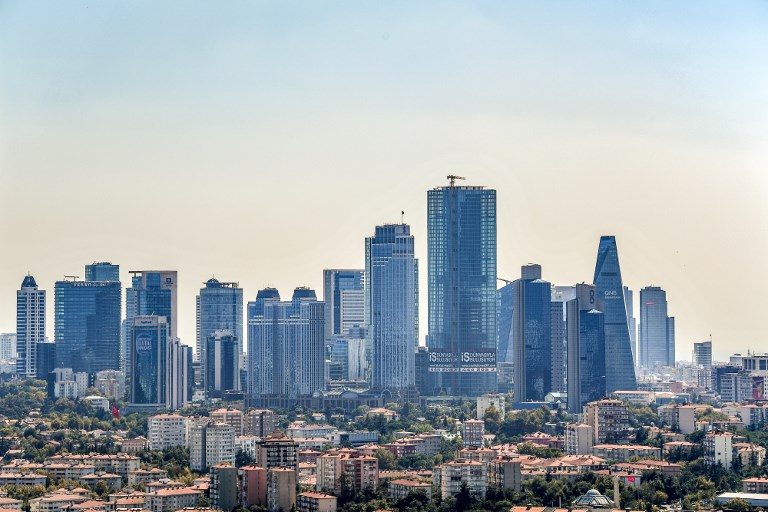SUMMARY
This is AI generated summarization, which may have errors. For context, always refer to the full article.

ANKARA, Turkey – Turkey’s economy fell into its first recession in a decade, official data showed on Monday, March 11, just weeks before President Recep Tayyip Erdogan’s government faces local elections when growth and inflation will be key issues for voters.
Economic output contracted by 2.4% in the final 3 months of the year compared to the third quarter on a seasonally and calendar-adjusted basis, the Turkish Statistics Institute (TUIK) said.
That followed a contraction in the third quarter. Two consecutive quarter-on-quarter contractions in economic output is widely considered to be the definition of a recession.
The flagging economy coupled with a currency crisis last year that battered the lira are sensitive issues for Erdogan and his ruling Justice and Development Party (AKP) before the municipal vote on March 31.
The Turkish leader, in power since 2003 first as prime minister and then as president, has often boasted of the country’s strong growth during his time in government.
Erdogan is frequently credited for the economic turnaround after the 2001 financial crisis and the far-reaching reforms spearheaded by a former economy minister after Turkey sought credit from the International Monetary Fund.
Growth came in at 2.6% for 2018 overall, but that was still much lower than the 7.4% recorded in 2017, a turbulent period following the 2016 failed coup and terror attacks.
The economy shrank by 3% in the 4th quarter of 2018 compared with the same period the previous year.
Inflation still high
Inflation has also remained high. It struck a 15-year peak in October at 25.24% before falling below 20% in February, with food prices hit particularly hard.
Erdogan’s government has sought to curb consumer prices, especially for produce consumed every day in Turkish households.
Turkish authorities last month set up their own vegetable stands in a bid to force markets to lower food prices.
But analysts said economic data showed inflation was still weighing on household consumption, and domestic demand was weak.
“Before the local elections Erdogan is trying to keep food prices in check, but after the elections, food inflation will probably rise further,” Nora Neuteboom, economist at ABN Amro, told Agence France-Presse.
Turkish Finance Minister Berat Albayrak, who is also Erdogan’s son-in-law, said on Twitter the data was as expected, but “the worst is behind us.”
That analysis was shared to some extent by the London-based Capital Economics research firm, but they offer cold comfort for Turkey’s economic outlook.
“While the worst of the downturn may now have passed, the weak carryover means that we expect GDP to decline by 2.5% this year,” said Jason Tuvey, senior emerging markets economist at Capital Economics.
Albayrak blamed the recession on “speculative attacks” and the current global economic slowdown.
‘Subdued growth’
Neuteboom said ABN Amro expected the Turkish economy to contract in the first 3 quarters of 2019 before showing positive growth in the last quarter.
“But we cannot really say that the worst is behind us, as Turkey enters a long period of subdued economic growth,” she said.
The last time Turkey entered a recession was in 2009 after the global economic crisis hit foreign and domestic demand.
Neuteboom said “it will take a rather long time for Turkey to get back to trend growth.”
Turkey’s economy was hit hard when US President Donald Trump doubled tariffs last year on Turkish steel and aluminium during a bitter row over a detained American pastor.
The lira plummeted in value in August reaching a record of 7 against the dollar.
The Turkish currency lost nearly 30% against the US dollar in 2018 despite rallying, especially after the pastor’s release in October.
While an aggressive interest rate hike in September helped brake its fall, economic activity stalled while prices of goods shot higher. – Rappler.com
Add a comment
How does this make you feel?
There are no comments yet. Add your comment to start the conversation.